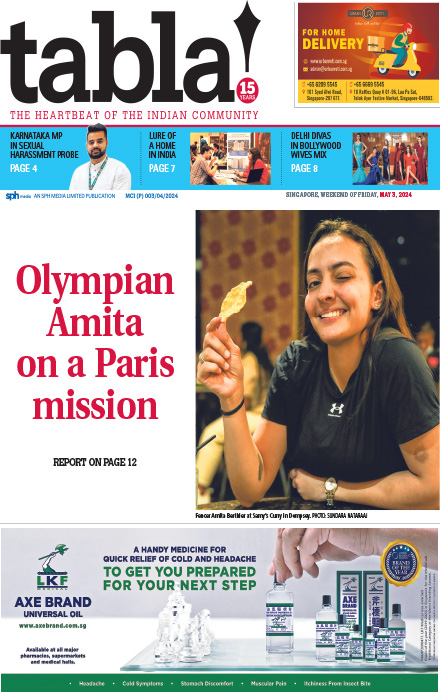It is difficult to make Mahatma Gandhi the side story in any event that involves him. Even if it is a play titled "Being Mrs Gandhi". Husband and wife Subin Subaiah and Daisy Irani have produced a timely play, at the initiative of the High Commission of India, to celebrate the Mahatma's 150th birthday, which fell on Oct 2.
It gives a perspective of Gandhiji from the best vantage point possible - that of his wife. But the problem for me is that most of the points made about Gandhiji in the play only reinforces what is known about him.
There are scenes which portray his predilection for sex, stubbornness and the major differences he had with his elder sons (played by Yogesh Tadwalkar and Krish Natarajan).
These have subtle humour and are impactful and refreshingly candid. However, what I really wanted was more in-depth information about his wife Kasturba (acted by Daisy).
Going by the title of the play, I had the impression it would unfurl hidden facets about this uneducated Gujarati woman, who was engaged to Gandhiji at the age of seven and married him when she turned 14.
The play has references to Kasturba's independent streak, such as not subscribing to all of Gandhiji's ashram rules, resisting his approach to untouchability and protecting her family from his experiments. Nevertheless, she is always seen as toeing his line.
Daisy, in an e-mail to me, conceded that "much more could have been told about Kasturba, but 90 minutes were not enough to depict all that, so we had to be selective". She added: "We tried to bring to light as much as we could find in our research, deduce, conclude. The rest was just too 'hidden' and could not be found."
Subin, the director and script-writer, said: "Kasturba was an accidental activist who had no independent initiatives of her own. She was, as (their eldest son) Harilal says in the play, dragged along for the ride. So, we can't really tell her story without telling the story of Gandhi - they are intrinsically interlinked."
My second grouse is the telling of the Kasturba story through an interaction between her younger self (played by Gauraangi Chopra) and older self (Daisy) which in certain parts left me scratching my head. Gauraangi's character appeared too bubbly, chirpy and playful at times - which made me wonder if the Gandhis had a daughter. (They actually had four sons.)
"It's a simple, creative story-telling device," maintained Daisy. "It totally worked for me and the audiences who gave us a standing ovation."
According to Subin, to tell the story of young Kasturba in an attractive fashion, he used the age-old Indian theatrical device of the Sutradhar or what the Greeks called The Chorus. "That way the story teller and the subject become one and it makes it far more interesting than having a large cast play out the first 30 years of her life in 25 minutes," he said.
I also felt the scene at a railway station where the Gandhis' elder son raves and rants against the Mahatma was contrived and artificial. Kasturba is rather passive as a drunk Harilal vents his fury at the father for not being concerned about him.
To Subin, it was an "important scene, first to establish the immense destructive nature of Gandhi's approach to bringing up his sons, and more importantly, to establish the monumental challenge it presented to Kasturba as a wife and as a mother".
If you ignore my nitpicking, Daisy and Subin have done a commendable job to narrate history with contemporary infusions. I particularly liked the mentions of Singaporean peculiarities.
I also take my hat off to Daisy's brilliant acting, the multimedia projection which transports you seamlessly from country to country and jail to ashram and the bhajans which were sung live with each verse and word having a profound meaning.
To tell the story of Gandhiji to people - especially Indians - in Singapore under the age of 40 is not easy. They do not know too much about him or his life or his philosophy.
To narrate that in a conventional way would have been too tedious as audiences these days like to watch stories that put things in perspective for them in an easy and absorbable way. As Subin said: "The mandate was simple. To tell an accessible, entertaining story of Kasturba, that's it."



